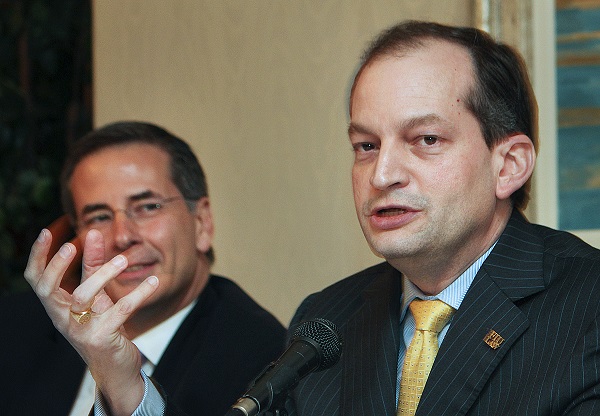 Secretary of Labor Alexander Acosta
Secretary of Labor Alexander Acosta
Labor Secretary Alexander Acosta defended his role as U.S. Attorney for the Southern District of Florida in securing a 2007 guilty plea for Jeffrey Epstein, the billionaire financier now facing child pornography and sex-trafficking charges in Manhattan.
The latest charges against Epstein have revived claims that the sexual predator received a “sweetheart deal” when he was sentenced to 18 months with work release for victimizing under-age women while Sec. Acosta was the top federal law enforcement official in Miami.
Sen. Chuck Schumer, D-NY, called on Acosta to resign today. President Trump has said he stands behind Acosta, who as of today is not resigning.
Acosta said he is pleased the case against Epstein is moving forward in the Southern District of New York, and called Epstein's acts “despicable.”
“He's a bad man,” Acosta said of Epstein. “And he needs to be put away.”
At today's press conference at the Labor Department, Acosta described the anomalous circumstances in which federal prosecutors in Miami intervened in a state case against Epstein.
In 2006, a Palm Beach country grand jury recommended a single solicitation of prostitution charge against Epstein, under which he could self-surrender, avoid jail time, and not have to register as a sex offender.
“The Palm Beach state's attorney office was ready to let Epstein walk free,” Acosta explained. “Prosecutors in my former office found this unacceptable, and they stepped in.”
Working with the FBI, prosecutors under Acosta negotiated a more stringent plea in state court that would have Epstein serve two years in prison, require him to register as a sex offender, and require him to pay restitution to his victims.
Were Epstein not to accept that deal, he would face federal prosecution, Acosta said of the arrangement.
Subsequent to that agreement, Epstein's counsel intimated that he would not comply with the deal, because another term negotiated after the plea would require Epstein to pay for his victims' attorneys in civil claims in which he was required to plead no contest.
According to Acosta, his office was faced with a gamble: a guarantee of putting Epstein in jail, registering him as a sex offender, and requiring restitution, or rolling the dice in federal court. His office chose the former.
“After the fact, people have alleged Epstein would have been easily convicted. These contentions overlook the facts that existed at the time,” said Acosta.
A decade ago, courts and juries were less understanding of victims' trauma in rape cases and were less accepting of contradicting testimony under oath. And today's benches do not allow victim shaming by defense attorneys, as was common then, considerations Acosta said his prosecutors weighed when deciding whether or not to pursue a federal indictment.
Acosta released two affidavits prior to the press conference—one from the lead prosecutor in the Miami office at the time, and one from the lead FBI investigator. Those support his position that his office struggled with the decision not to federally charge Epstein, and that the risk of the predator walking free under a federal indictment was real, Acosta said.
“There is a big gulf between sufficient evidence to go to trial, and sufficient evidence to be confident in the outcome of that trial,” explained Acosta, who underscored several times that the decision not to pursue federal charges was made by a team of prosecutors with dozens of years of experience, and not the decision of one person.
“I wanted to help them—we wanted to help them,” Acosta said of Epstein's victims. “That's why we intervened and put the world on notice that he was and is a sexual predator. Epstein's actions absolutely deserve a stiffer sentence.”
Acosta said his team proceeded appropriately, and that based on the evidence, there was value in getting Epstein in jail and registering him as a sex offender.
“I understand what the victims say,” said Acosta, referencing Epstein's victims who have publicly come forward to detail their atrocities and question the leniency he received.
“I am here to say we did what we did because we wanted to see Epstein go to jail. He needed to go to jail. That was the focus,” said Acosta.
The original two-year sentence the U.S. Attorneys sought was reduced to 18 months. The work-release component of Epstein's sentence was not what federal prosecutors bargained for, but was issued under terms of Florida's statutes, which had jurisdiction over the sentencing.
“The work release was complete BS,” said Acosta. “Outrage over that is entirely appropriate.”
Acosta implored all of Epstein's victims to come forward, and more jurisdictions to bring charges.
“I have seen these interviews (with the victims) and I can't begin to fathom what they have been through. The closest I can come is if how I would feel if one of my girls were going through this,” feelings Acosta said he could not convey on live television.
Asked if someone at the Department of Justice ordered him to cut a deal with Epstein at the time, Acosta said his office stayed true to the terms with the state court throughout the several month negotiations.
Acosta said his relationship with President Trump is “outstanding.”
“If at some point the President decides I'm not the right person to do this job, I respect that,” he added.
© 2025 ALM Global, LLC, All Rights Reserved. Request academic re-use from www.copyright.com. All other uses, submit a request to [email protected]. For more information visit Asset & Logo Licensing.








